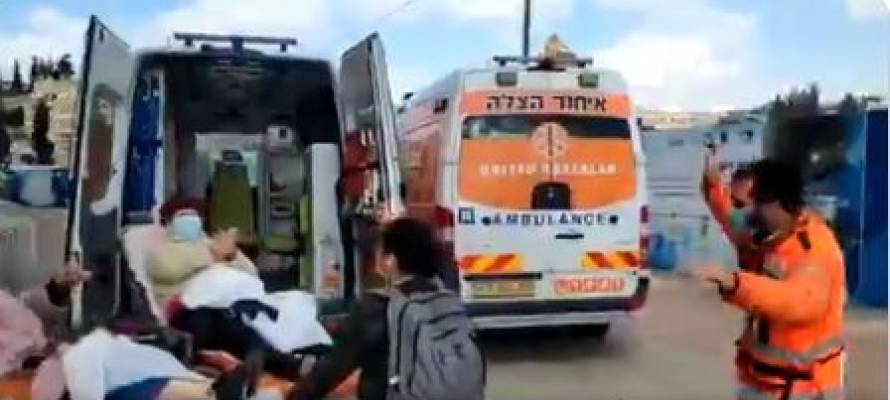Ben Haroush describes the ambulances as ‘a terrifying train.’ They were ‘full of blood and groans, like a conveyor belt running non-stop.’
By Shula Rosen
Although Aharon Ben Haroush, 28, EMT and ambulance dispatcher for United Hatzalah, had witnessed the horrors of war rescuing Ukrainians in 2022, nothing prepared him for the scale of October 7th when he set out from Jerusalem that fateful morning.
He told the Times of Israel, “I had seen casualties but never imagined encountering something of this scale. The scale was enormous.”
After celebrating Simchat Torah the night before, he was awakened in the Jerusalem hotel room he shared with his wife and toddler son with a phone call from call from Nehorai Darshan, head of the United Hatzalah branch in Sderot.
He heard there was a major emergency in the South. As he heard sirens signaling missiles were headed towards Jerusalem, he dispatched ten ambulances and took off to the south with his mother-in-law, Gitty.
“Nobody knew what was happening,” Ben Haroush said. “We understood something was happening, but nobody understood exactly what.”
When he reached Sderot, Ben Haroush was traveling on Route 232, known as the “Road of Death” and reported seeing “fear and chaos.”
After seeing footage of a jeep filled with terrorists armed with M-16s shooting at police in Sderot, he had no idea whether vehicles approaching belonged to civilians or terrorists.
With no sirens and missiles firing constantly Ben Haroush set up a command center organizing ambulances and “crazy” medics “Who would risk anything to do good.”
Unsure about whether the medics would return alive, he dispatched them to Kfar Azza, Sderot, and Be’eri, giving them hugs as they left.
Although Ben Haroush often hugs people, he added, “This felt different — it felt like it could be a goodbye hug because there was a chance some of these people wouldn’t come back.”
He even sent his mother-in-law Gitty and his brother-in-law Meir Shmuel, knowing he would be “emotionally scarred” if they didn’t return.
Ben Haroush recalls seeing a soldier driving towards him with a car filled with soldiers who were injured and who had succumbed to their wounds during the journey. He had to encourage the soldier to return and fight, although the soldier did not want to abandon his fallen comrades.
He recalls having to leave the dead behind and said, “It’s a tough decision, but the living are the ones who matter.”
Ben Haroush describes the ambulances as “a terrifying train. They were “full of blood and groans, like a conveyor belt running non-stop.”
He recalls the moment he realized that civilians were being killed as well and saw a teenager who ran for 15 kilometers with a bullet hole in her leg.
Meanwhile volunteers poured in and began helping in countless ways.
“Nobody cared who was religious and who wasn’t,” he said. “A man in a prayer shawl carried a girl in a bikini who was wounded at the festival.”
When he reached Kfar Azza, Ben Haroush said soldiers were fighting terrorists who were slaughtering people.
One commander told him to take the bodies of several dead soldiers with him.
When Ben Haroush explained that he was focused on bringing back the injured rather than the dead, the commander said, “I need you to take them for the morale of my soldiers. If my soldiers see the dead, they will all break down.”
Ben Haroush expressed frustration for not being able to get to the wounded while the massacre was going on, and it was the tanks, rather than the ambulances, that had to transfer the injured to safety.
One bright spot of the day was when he saw that his grandmother, who lived in Sderot, had survived. When they met at Heletz Junction, she cried and held his hand.
“She lost faith in everything else,” Ben Haroush said. “I was the first hope she saw.”
A year later, Ben Haroush says he struggles to return to normal life and still remembers the frustration of not having enough assistance.
“We were the only ambulances in that area,” he said. “We begged and begged for more help but didn’t get it.”
Still, in addition to getting psychological treatment to deal with the flashbacks, Ben Haroush said helping people is one of the best forms of therapy.
“We were there, right in the heart of the fighting, amid the bombardments, to provide answers and help,” Ben Haroush said. “I know that I did the best that I could, and I am sure of it, and that helps me a lot.”
